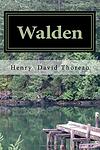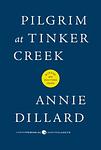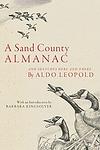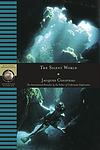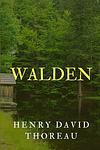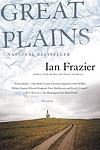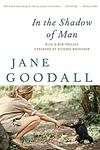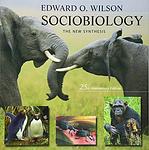The Greatest "Nonfiction, Nature & Environment" Books of All Time
Click to learn how this list is calculated.
This list represents a comprehensive and trusted collection of the greatest books. Developed through a specialized algorithm, it brings together 300 'best of' book lists to form a definitive guide to the world's most acclaimed books. For those interested in how these books are chosen, additional details can be found on the rankings page.
Genres
The "Nature & Environment" category encompasses a broad range of books that delve into the intricacies of the natural world and the complex relationship between humans and their environment. Titles within this genre may explore topics such as wildlife, ecosystems, conservation efforts, climate change, and sustainability. They can include scientific texts that provide in-depth analysis of environmental processes, as well as more narrative-driven works that aim to inspire appreciation and stewardship of nature through personal anecdotes, stunning photography, and explorations of the beauty and diversity of the Earth's flora and fauna. This category is designed for readers who are curious about the planet's natural wonders, concerned about environmental issues, and interested in learning about ways to protect and preserve the world for future generations. Whether through practical guides on living more sustainably or through compelling stories of outdoor adventure, books in the "Nature & Environment" genre aim to educate, inform, and sometimes mobilize readers to engage with the natural world around them.
Countries
Date Range
Reading Statistics
Click the button below to see how many of these books you've read!
Download
If you're interested in downloading this list as a CSV file for use in a spreadsheet application, you can easily do so by clicking the button below. Please note that to ensure a manageable file size and faster download, the CSV will include details for only the first 500 books.
Download-
1. Silent Spring by Rachel Carson
This influential environmental science book presents a detailed and passionate argument against the overuse of pesticides in the mid-20th century. The author meticulously describes the harmful effects of these chemicals on the environment, particularly on birds, hence the metaphor of a 'silent spring' without bird song. The book played a significant role in advancing the global environmental movement and led to a nationwide ban on DDT and other pesticides in the United States.
-
2. Walden by Henry David Thoreau
This work is a reflection upon simple living in natural surroundings, inspired by the author's two-year experience of living in a cabin near a woodland pond. Filled with philosophical insights, observations on nature, and declarations of independence from societal expectations, the book is a critique of the complexities of modern civilization and a call to appreciate the beauty and simplicity of the natural world. It explores themes such as self-reliance, solitude, and the individual's relationship with nature.
-
3. On Liberty by John Stuart Mill
This influential philosophical work explores the concept of personal freedom and societal limits, arguing that individuals should have the right to act as they want, provided they do not harm others. The book elaborates on the nature and limits of the power that can be legitimately exercised by society over the individual, and champions individuality and nonconformity. It also discusses freedom of speech, asserting that all opinions should be openly expressed to prevent any single viewpoint from becoming dogma.
-
4. Pilgrim at Tinker Creek by Annie Dillard
This book is a personal narrative of the author's explorations near her home at Tinker Creek in Virginia's Blue Ridge Mountains. The narrative is filled with detailed observations on nature and philosophical musings. It reflects on themes of solitude, the presence of God in nature, and the interconnectedness of life. The author's deep reflections and contemplations about the mysteries and beauty of the world make it a profound meditation on the natural world.
-
5. Desert Solitaire by Edward Abbey
Desert Solitaire is a collection of vignettes about life in the wilderness that reflects on the fierce beauty of the desert, the cruel indifference of nature, and the reckless destruction of the American West. The book, based on the author's experiences as a park ranger in Utah, explores the spiritual and philosophical dimensions of the desert environment, critiquing the commercialization and urbanization of the wild, and underscoring the importance of preserving natural landscapes.
-
6. The Snow Leopard by Peter Matthiessen
"The Snow Leopard" is a travelogue that recounts the author's two-month journey in the Himalayas with naturalist George Schaller. The duo trek through the rugged and remote mountains of Nepal on a quest to study the rare blue sheep and possibly spot the elusive snow leopard. The book is as much a spiritual journey as it is a physical one, with the author seeking solace and understanding following the death of his wife. The narrative explores themes of grief, nature, and Buddhism, offering a poignant and introspective look at life and loss.
-
7. The Worst Journey in the World by Apsley Cherry-Garrard
"The Worst Journey in the World" is a gripping account of the Terra Nova Expedition to the South Pole in 1910-1913. The book vividly describes the perilous journey undertaken by a team of explorers, their struggles with brutal weather conditions, and the tragic loss of their leader and four other members on their return from the Pole. The narrative is not only about physical survival in harsh conditions, but also about the psychological toll of such an expedition, making it a timeless testament to human endurance and spirit.
-
8. The Voyage of the Beagle by Charles Darwin
This book is a vivid and exciting travel memoir as well as a detailed scientific field journal covering biology, geology, and anthropology that demonstrates the author’s keen powers of observation, written at a time when Western Europeans were still discovering and exploring much of the rest of the world. The author's five-year journey took him from the coasts of South America, Australia, and Africa to the South Pacific islands, during which he collected and documented the natural history of these areas. The voyage and the specimens he brought back would later form the basis for his famous theory of evolution.
-
9. A Sand County Almanac by Aldo Leopold
This book is a compilation of nature-related essays that highlight the author's experiences and observations as a conservationist. The author provides a thoughtful and eloquent reflection on the relationship between land and people, emphasizing the importance of conservation and sustainability. Through his writings, he advocates for a 'land ethic' where humans view themselves as part of the natural community rather than conquerors of it, promoting a harmonious coexistence with nature.
-
10. My First Summer in the Sierra by John Muir
This book is a personal narrative of the author's journey through the Sierra Nevada Mountains in California during the summer. The author, a naturalist, describes in detail the stunning landscapes, flora, and fauna he encounters during his exploration. His deep appreciation for nature and wilderness is evident in his vivid descriptions and philosophical reflections. The book serves as a call to preserve and respect the natural beauty of the environment.
-
11. The Natural History and Antiquities of Selborne by Gilbert White
"The Natural History and Antiquities of Selborne" is an exploration of the natural world in the English village of Selborne. The author, through a series of letters, provides detailed observations and insights into the flora, fauna, weather and geology of the area. The book also sheds light on the history and antiquities of the village, offering a comprehensive view of Selborne during the 18th century.
-
12. The Sixth Extinction: An Unnatural History by Elizabeth Kolbert
The book explores the concept of the sixth extinction, suggesting that we are currently in the midst of it due to human activity. By examining previous mass extinctions and the current rapid loss of species, the author argues that humans are causing a mass extinction event through climate change, habitat destruction, and spreading of non-native species. The book offers a sobering look at the impact of human behavior on the natural world, emphasizing the urgency of addressing these environmental issues.
-
13. Into Thin Air by Jon Krakauer
This gripping non-fiction book recounts the tragic events of the 1996 Mount Everest disaster. The author, a journalist and experienced climber, was part of a commercial expedition to summit Everest. The expedition soon turned disastrous due to a severe storm, leading to the death of several climbers from various teams. The book provides a vivid, personal account of the harrowing ordeal, detailing the physical and psychological challenges faced by climbers at high altitudes, as well as the ethical and commercial aspects of mountaineering expeditions.
-
14. The Silent World by Jacques Cousteau
"The Silent World" is an autobiographical account of a pioneering oceanographer and his team's underwater explorations. The book documents their adventures and discoveries, including the development and use of the first scuba diving equipment. The author shares his experiences of exploring shipwrecks, interacting with various marine life, and the dangers they faced in the depths of the ocean. The book also emphasizes the importance of marine conservation and the need to protect our oceans.
-
15. Essays of Henry David Thoreau by Henry David Thoreau
This collection of essays presents the profound reflections of a renowned philosopher and naturalist on a variety of subjects, including nature, self-reliance, civil disobedience, and transcendentalism. The author's eloquent prose and deep insights into human existence and the natural world continue to inspire readers, offering a timeless perspective on living a meaningful, deliberate life. His views on individualism and nonconformist thought have had a significant impact on both personal and political spheres.
-
16. Journals by Meriwether Lewis, William Clark
This book is a compilation of the detailed journals kept by two explorers during their expedition across the American West, from 1804 to 1806. The journals provide a first-hand account of their encounters with Native American tribes, their observations of new plant and animal species, and the challenges they faced while traversing uncharted territories. The explorers' writings not only offer insights into their historic journey but also serve as a valuable resource for understanding early 19th-century American history and the country's westward expansion.
-
17. Arctic Dreams by Barry Lopez
"Arctic Dreams" is a comprehensive exploration of the Arctic region, its landscapes, wildlife, and indigenous cultures. The author combines his personal experiences from his time spent in the Arctic with historical, scientific, and anthropological insights, providing readers with a profound understanding of this remote and often misunderstood region. The book also discusses the impact of climate change on the Arctic and its implications for the rest of the world.
-
18. King Solomon's Ring by Konrad Lorenz
This book is a fascinating exploration of animal behavior by a renowned zoologist. It delves into the author's personal experiences and observations of animals in their natural habitats, focusing particularly on birds, dogs, and jackdaws. The author uses these observations to draw conclusions about animal psychology and behavior, often comparing it to human behavior. The book is named after the biblical King Solomon, who was said to have a ring that allowed him to understand the language of animals.
-
19. The Unsettling of America by Wendell Berry
This book is a profound critique of modern industrial agriculture, arguing that it degrades the land and disconnects people from their food sources. The author advocates for a return to more traditional, sustainable farming methods, which he believes will lead to healthier communities and a more balanced relationship with the environment. He also explores the broader cultural implications of this shift, including the potential for greater self-reliance and a deeper sense of connection to the natural world.
-
20. Great Plains by Ian Frazier
"Great Plains" is a travelogue that takes readers on a journey through the vast expanse of the American Great Plains, exploring its history, geography, and culture. The author travels from North Dakota to Texas, delving into the history of Native Americans, pioneers, and outlaws. The book provides a detailed account of the region, its people, and its significance in shaping the American West, offering a vivid portrait of the landscape and its influence on the country's identity.
-
21. In the Shadow of Man by Jane Goodall
This book provides a fascinating and detailed account of the author's groundbreaking research on wild chimpanzees in Africa. The author offers insights into the complex social structure, behavior, and personalities of these primates, challenging the then-prevailing scientific belief that only humans were capable of having personalities and emotions. Through her studies, the author revolutionized our understanding of our closest relatives in the animal kingdom, and she also discusses the threats to their survival and the many challenges they face due to human activities.
-
22. The Perfect Storm by Sebastian Junger
This non-fiction book narrates the story of the Andrea Gail, a commercial fishing vessel that was lost at sea during the "Perfect Storm" of 1991. The author combines meteorological science, history, and personal accounts to paint a vivid picture of the harrowing ordeal faced by these six fishermen. The book also explores the dangerous profession of deep-sea fishing and the tight-knit communities that are affected by such tragedies.
-
23. In the Heart of the Sea by Nathaniel Philbrick
This historical narrative tells the true story of the 19th-century whaleship Essex, which was rammed and sunk by a sperm whale in the South Pacific. Stranded thousands of miles from land, the crew of the Essex was pushed to their limits and forced to do the unthinkable to stay alive. The tale explores the harrowing ordeal of these men through their long journey at sea, their encounters with nature's fury, hunger, disease, and their own fear and despair.
-
24. Sociobiology by E. O. Wilson
"Sociobiology" is a comprehensive and scholarly work that explores the biological basis of social behavior in all species, including humans. The author weaves together findings from various fields such as ethology, anthropology, evolution, and genetics to propose a new discipline - sociobiology. He suggests that social behavior, including altruism, aggression, and nurturance, is not just a product of learning and environment, but also has a genetic basis. This work sparked considerable debate and controversy, particularly regarding its implications for human behavior and society.
-
25. The Solace of Open Spaces by Gretel Ehrlich
This book is a collection of essays that explore the author's experiences and observations after moving from the city to the rural landscapes of Wyoming. The narrative delves into the harsh and beautiful realities of living in the American West, the author's personal healing after a tragic loss, and the solace found in the vast open spaces. The book is a profound meditation on nature, solitude, grief, resilience, and the transformative power of landscape.
Reading Statistics
Click the button below to see how many of these books you've read!
Download
If you're interested in downloading this list as a CSV file for use in a spreadsheet application, you can easily do so by clicking the button below. Please note that to ensure a manageable file size and faster download, the CSV will include details for only the first 500 books.
Download
